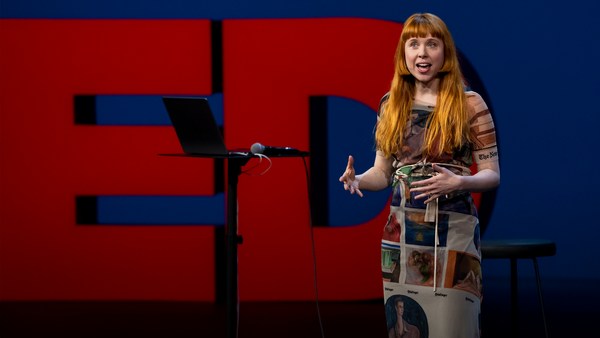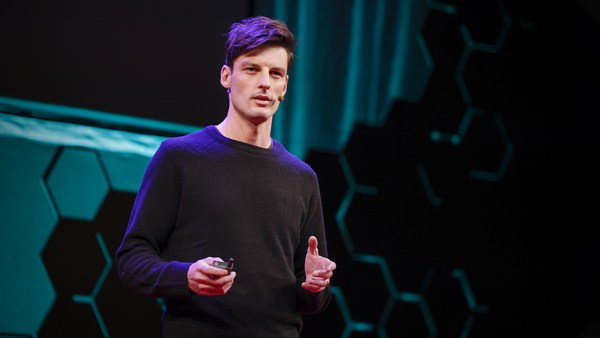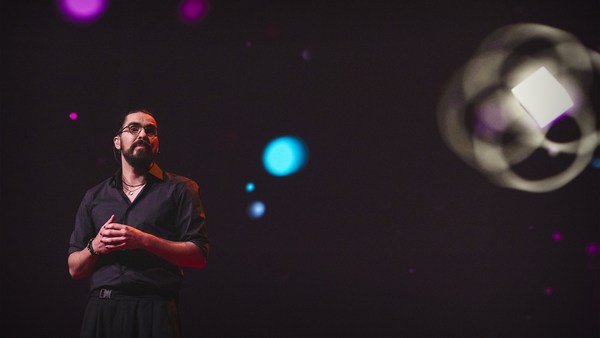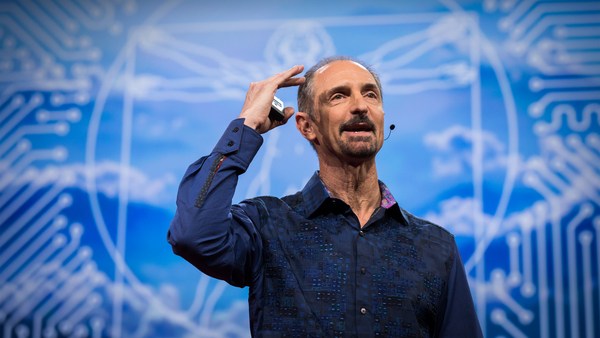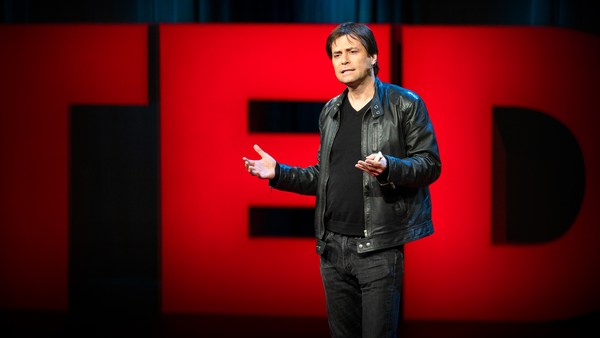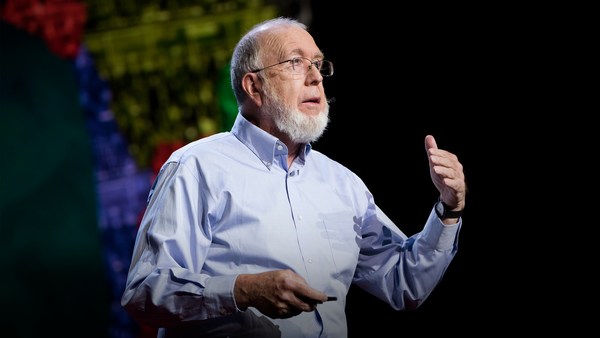Right off the jump, I want to start by explaining my feelings. I'm scared to death.
(Laughter)
I'm scared of the effect that AI could have on music and on music creators like me.
I started thinking about preparing for this conversation. I was trying to figure out what I could bring to this talk, what new and insightful perspective could I give. I mean, it's a topic that we've heard so much about, we've all heard everything about AI. What I came down to was, because I'm a songwriter, and I have been for the last couple decades, but I'm also the CEO of the Recording Academy, and I represent our 25,000 members, so I see things in two very different ways.
I've been using AI for the last, say, nine or 10 years. I've always been an early adopter to new technologies. I was using Pro Tools when it first came out. It was two tracks. I was using Auto-Tune and Melodyne. I've been making records on a laptop since the beginning of laptops. I could see, as a creator, what kind of a powerful tool AI could be to enhance human creativity. But I've also seen the danger and the risk AI presents to possibly replacing human creativity.
So because of that, and because of the speed at which it's all changing, I'm choosing to focus my efforts and energies on making sure human creativity can endure. So this is a survival guide for human creators in the age of AI.
The way I see it, there are four steps. It's understand, adapt, advocate and compete. If we are going to survive as human creators, we have to understand AI. We have to know what it does, how it works. What does it learn? What are the capabilities?
Now I've got a studio back in LA. I've got a group of incredible musicians, producers or songwriters or engineers. One of them is a guy named Andrew. He's been working with me for 18 years. I hired him right out of college. I've seen him get married and have a daughter, seen him buy a house and do a remodel. But anyways, Andrew and I get along really well because we're both techies. We love new things, we love evolution. We love new gadgets and products.
So at one point, I asked Andrew, I said, "We're hearing a lot about AI. Generative AI, generative AI ... I want you to get the team together and I want you to do a deep dive. I want you to understand everything there is to know about generative AI. I'm going to go out of town, and when I come back, let's have a talk. You can update me."
Come Monday, I show up at the studio. I walk in, expecting these guys to be on their instruments, playing keyboards and smiling. But what I saw was very different. It was the look of disgust. They were lost, they looked like they'd been hit in the stomach.
They said, "Harvey, we've been using AI all weekend. We're screwed."
(Laughter)
"We don't think we can make a living making music anymore."
I said, "Why, guys, what's going on?"
They said, "When we text what we want into an AI generative model, it's spitting out songs. It takes us weeks to make a song. It takes AI seconds."
Andrew, I saw it in his eyes, he was worried about his family, he was worried about his daughter. He was probably worried about his remodel. But he said, "I don't think I can make a living because of this." And I remember him saying, "I feel like I'm obsolete."
I tried to talk him off the ledge. I said, "Andrew, don't worry, we understand this technology. We know what it can do now. We have to adapt." And that's our second step, adapt.
Now adapting is nothing new. As creatives, we've been doing it our whole career. We've done it from the very beginning, ever since people started creating. Think about it, there's been so many technological advancements, even back in the days when piano players and the first piano roll was invented. Remember the player pianos, and all the piano players, they were freaking out. "What am I going to do? Nobody needs to listen to me play. We can listen to the player piano." Well we still have piano players. Because I grew up in a musical family, I grew up with a mom who was an amazing musician. My dad was an amazing musician. And my house was full of music. Everywhere you looked, there was music. We had this one room, it was a music room. Downstairs, there was this staircase of stones. There's this old cruddy brown carpet. There was actually cork on the walls. For some reason, they thought that would absorb the sound. What was really great was there was a drum set there, there was a keyboard, a record player. There were these big speakers that played music really loud, and I would love to sit in that room. But what I really loved was watching my dad practice. He would practice in the morning, practice all day, practice at night. In the morning, he'd have his headphones, practice on the little pads. I'd come back from school, he'd still be practicing. But he practiced his way into being an elite, incredible musician. He loved his craft.
One day, he came home from a session, I'll never forget it. He sat down. He looked dejected. He actually looked like my engineer, he looked like Andrew. And he said, "I've seen something today that is threatening our livelihood and my ability to make a living as a drummer. Somebody came to the session today with a drum machine." It was called a Linn LM-1 drum machine. And he said, "I think I'm not going to be able to continue making a living." He actually said, "I feel obsolete."
So he moped around the house for a couple of days, and then a box showed up, and my sister and I helped unwrap it. My dad was there. It was very exciting. He didn't know what it was. It was an orange-lidded crate. We opened it. Down there, there was a black box, and on the top of the box, it said "Linn LM-1 Drum Machine." I pulled it out. I said, "Dad, what are you doing with this in the house? Who let this devil in here?"
(Laughter)
And he said, "Don't worry about it. I’m going to learn how to program it like nobody you’ve ever heard before ... I’m not going to let technology take my career. I’m going to use that technology to enhance my career, to extend my career.” And that's what he did. He practiced how to program that dang drum machine. He ended up being the first drummer to ever use a drum machine on a record, if you can believe that. So this is the first exposure, the first experience for me to see somebody adapt, to take a disruptive technology and flip it to the benefit of their career, and to see somebody that I loved and respected and looked up to do that was so powerful for me.
So we know we've got "understand." We know we've got "adapt." The third step is "advocate." We've got to make sure we're advocating to anyone who will listen. I don't care if it's a tech developer or a programmer, a record company, a journalist, a production company publisher or a lawmaker. So it's been amazing. In my career, I've had an unbelievable opportunity to meet with people who can really make a difference, and this is still crazy to me. I got the chance to meet with the woman who runs the Federal Copyright Office. She came down to my studio. She's an amazing, incredibly smart woman, and we sat together and we talked about generative AI. We talked about how much human interaction constitutes a copyrightable work, what is protectable, what is monetizable, what's even legal. We had an incredible talk. We didn't come up with any answers, but it was a really productive conversation. And so I've had a couple occasions where I've had great conversations with people who can really make a difference.
The next opportunity was, I had the incredible chance to talk to members of Congress and testify. So I got to where I was going, I got my suit on. I got sworn in. I nervously sat down behind the long desk, with the name and everything, and I started talking to the leaders of our government about human creativity and human artistry. I started telling them our fears, our concerns, the things that were important to us, and they were into it. I was loving it. I was like, "This is amazing." Both sides of the aisle, everybody was asking questions and telling stories about the music that they loved. And at the end of the meeting, they all said, "We have to protect human creativity, human artistry."
So since then, we've gotten a couple bills passed on the state level. We now have a federal bill moving through the House and Senate, called the "No Fakes Act." We hope it will be signed by the end of the year to start protecting human artistry. That's what we have to do. We have to advocate. So again, understand, adapt, and then third, advocate.
Now I had an opportunity to play in the Final Four with an athlete named Steve Kerr, and for a Hall of Fame coach named Lute Olson. And if those names mean anything to you, you'll know why this step is important to me. Step four is "compete." We have to compete. We have to get after it. And if we're going to compete as humans, we have to do these four steps. So in order to compete, we have to know what AI does. We have to know how it does it.
Now I’ve been competing my whole life. There's never been a time when I wasn't competing. But as human creators, we now have to step it up a level. We have to do what we've always done. We have to innovate. We have to create from the heart, from the soul. We have to tell stories that only we can tell, because we've lived and we've loved, and we've laughed and we've cried. We've fought, we've celebrated, we've dreamt, we've believed. We have to take the uncertainty and the chaos that is our lives -- the stuff that computers and AI hate, by the way -- and we have to use that to create inspired art. We have to push ourselves to come up with that next amazing thing. We have to dig back deep into our most creative places and make music that no AI or text prompt can ever match. We have to compete.
Now what I know is AI is never going to be able to create, without us, anything all that cool, without learning from us. It's just not. We can talk about unsupervised learning, we can talk about how fast this is all evolving, but no one can tell me that AI is going to create “Songs in the Key of Life” or “Nevermind” by Nirvana or “Illmatic” by Nas or "Kind of Blue." It's not happening. But what will happen is it will probably create some pretty good music that is working for an algorithm, that sounds, maybe, like a song we've heard, and maybe that we've liked before. But beyond that, it's not going to compete with what we do. So as humans, we must compete. We must compete.
Now I believe in the supreme and complete power of music ... and that's why this is so important. Music can change hearts. It can change minds. It can heal. It can unite. And we all know we need more of that right now. I believe in the wonderful and amazing power of human creators and their ability to make music that can move the world. Now is creativity and art and music going to change in the future? Absolutely. We can count on it. But that’s exciting. The way I see it, if human creativity is going to survive, if human creativity is going to thrive, we must understand, adapt, advocate and compete. So our stories, our emotion, our humanity live on, and we can continue to create the music that connects us all.
Thank you.
(Applause)
